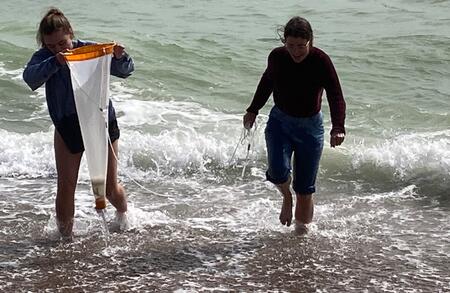Course Instructor: Dr Simon Coppard - simon.coppard@queensu.ca
In Summary:
Introduction to life in the World's oceans and seas from a global, ecological, and evolutionary perspective. Study of marine habitats, food webs, biodiversity, ecological processes, functional biology, adaptations of marine organisms, and human impacts on marine life (fisheries and environmental impacts).
![]()
![]()
Course Highlights: 
-
Learn how mankind can conserve and sustainably use the oceans, seas and marine resources.
-
Study the World's oceans and seas from a global, ecological and evolutionary perspective.
-
Combine functional biology with ecological thinking, to understand factors that influence the distribution and abundance of organisms and species interactions.
-
Address global issues of climate change (SDG 13), fisheries management, invasive species, pollution, and sustainability.
Course Information:
An introduction to life in the World's oceans and seas from a global, ecological and evolutionary perspective. You will study marine habitats, food webs, biodiversity, ecological processes, functional biology, adaptations of marine organisms, and human impacts on marine life (fisheries and environmental impacts). This course will address the issues raised by United Nations Sustainable Development Goal (UN SDG) 14 “Life below Water”. Students will learn how we can conserve and sustainably use the oceans, seas and marine resources if the appropriate action is taken and measures are put in place to protect these incredibly diverse and valuable ecosystems.
Learning Outcomes:
This course will introduce students to life in the World's oceans and seas from a global, ecological and evolutionary perspective. Students will learn the principles used to study and explain biodiversity, and the evolutionary and ecological processes that regulate it. This class will explore functional biology and how marine organisms are constrained by their physical and chemical environment but have evolved diverse ways to be successful, even in extreme conditions. By combining functional biology with ecological thinking, students will learn to understand factors that influence the distribution and abundance of organisms and species interactions. Initial lectures will provide a historical context both in how marine biology has been studied and the processes that have resulted in present-day species distributions. We will explore ecology from the level of populations to ecosystems, from the tropics to the poles, and the shallow seas to the deep ocean floor.
 In class, we will address global issues of climate change (SDG 13), fisheries management, invasive species, pollution, and sustainability from a diverse sector, including points of view from indigenous people from throughout the World. This will address UN SDG 14, with a particular focus on assigning large-scale marine protected areas, and will also include sustainable tourism (SDG 8) and small island developing states (SDGs 12, 13, 14, & 17). This class will encourage marine ecological stewardship and the role every person can play in habitat restoration and the protection of marine habitats.
In class, we will address global issues of climate change (SDG 13), fisheries management, invasive species, pollution, and sustainability from a diverse sector, including points of view from indigenous people from throughout the World. This will address UN SDG 14, with a particular focus on assigning large-scale marine protected areas, and will also include sustainable tourism (SDG 8) and small island developing states (SDGs 12, 13, 14, & 17). This class will encourage marine ecological stewardship and the role every person can play in habitat restoration and the protection of marine habitats.
Experiential and Active Learning Opportunities:
Weekly labs will relate to topics covered that week in class and teach the students molecular, morphological, and ecological techniques. Our close proximity to the diverse UK coast will allow this course to have a strong fieldwork component with four days of discovering and measuring species richness, biodiversity, and species distributions in sandy shore habitats, rocky shores, and estuarine habitats at low tide. Students will learn sampling techniques and experimental methods that include how to analyze data that they generate through the use of statistics (Plymouth Routines in Multivariate Ecological Research) and how to formulate hypotheses that can be tested. Plankton sampling from the shore will provide insights into the life cycles of many species and their importance in the food chain, in carbon acquisition, and in monitoring the health of the environment.
Prerequisites and Exclusions:
Prerequisite BIOL103, or permission of the instructor. Exclusion ENSC307; GEOL200.
Course applicable to the following Majors/Medials/Minors:
BIOL

